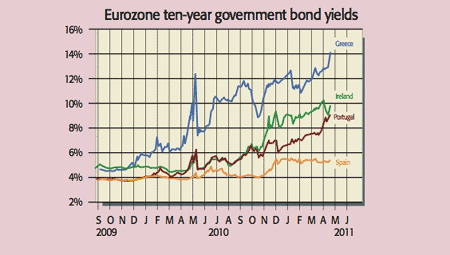Get the latest financial news, insights and expert analysis from our award-winning MoneyWeek team, to help you understand what really matters when it comes to your finances.
You are now subscribed
Your newsletter sign-up was successful
Want to add more newsletters?

Twice daily
MoneyWeek
Get the latest financial news, insights and expert analysis from our award-winning MoneyWeek team, to help you understand what really matters when it comes to your finances.

Four times a week
Look After My Bills
Sign up to our free money-saving newsletter, filled with the latest news and expert advice to help you find the best tips and deals for managing your bills. Start saving today!
After a few weeks of calm, the eurozone debt crisis is back in the spotlight. Comments by German officials apparently admitting that Greece will eventually need to restructure its debts in other words, default have propelled the Greek ten-year yield to a new crisis high of over 14%. Ratings agency Moody's has downgraded Irish bank debt to junk, and Irish sovereign paper to the verge of junk.
The Finnish election last weekend casts "significant doubt" over Portugal's bail-out package, which is currently being negotiated, says Richard McGuire of Rabobank. The anti-euro party True Finns looks likely to be included in coalition negotiations. It opposes a Portuguese bail-out and could stymie the expansion of the eurozone rescue fund. Also "surprising and very troubling", adds The Economist, is that jitters have extended to Spain, which appeared to have shaken them off over the past few weeks. Its ten-year yields are at a decade-high.
The periphery is in a debt trap
It's hardly news that Greece is heading for a restructuring, says Irwin Stelzer in The Wall Street Journal. How can it "escape the debt trap" if it has to pay 20% for two-year money while the economy is shrinking? Its overall debt pile is expected to exceed 150% this year. Ireland and Portugal look stuck in a similar bind: with slow or no growth. Austerity just weakens the economy further, prompting yet more borrowing, making it impossible to get on top of the debt.
MoneyWeek
Subscribe to MoneyWeek today and get your first six magazine issues absolutely FREE

Sign up to Money Morning
Don't miss the latest investment and personal finances news, market analysis, plus money-saving tips with our free twice-daily newsletter
Don't miss the latest investment and personal finances news, market analysis, plus money-saving tips with our free twice-daily newsletter

Spain is in better shape than the countries that have been bailed out. But "it is far from being a rock-solid bet to avoid the need for help". Rising unemployment, declining incomes and the European Central Bank's recent interest-rate hike all militate against growth meeting the central bank's relatively optimistic forecasts. Banks remain undercapitalised. Moody's thinks they need €120bn six times the government's estimate.
Restructuring could cause a meltdown
The likelihood, says Simon Nixon in The Wall Street Journal, is that "European banks are not yet strong enough to absorb losses from a haircut in government bonds, nor the likely turmoil in bond markets associated with haircuts, raising the prospect of another financial crisis". The International Monetary Fund reckons that a third of the EU's banks don't have enough capital, says Sean O' Grady in The Independent. Banking exposure to the periphery is huge. For instance, overseas banks have lent banks and governments in Greece, Spain and Portugal $362bn. Around a third is held by German banks, says Robert Peston on BBC.co.uk. Even with the "heroic assumption" that a third of this debt needs to be written down to bring it back to a sustainable level, German banks "would not be able to shrug off" $39bn of potential losses.
German exposure to government, bank and private-sector debt in Greece, Ireland and Portugal is around €230bn, reckons The Economist. Its exposure to Spain is about 75% of this total. The chance of another Lehman-style meltdown in Europe's interlinked economic and banking system, even from a Greek default alone, says O'Grady, "is real".
It's "just about plausible" that the markets could take a Greek restructuring in their stride, "provided it were orderly", reckons Capital Economics. But "such events are rarely orderly". Restructuring certainly wouldn't be if it drags Spain into the crisis. Or if one of the southern states decides it's fed up with austerity and won't pay its bondholders. It could only be orderly if the eurozone prepares for it thoroughly. But given its track record, says The Economist, the risk is that "Europe will finally recognise the need for restructuring in Greece, but will again pursue half-measures that fail... to get ahead of markets". Capital Economics expects the euro, still above $1.43, to fall to $1.30 by year-end.
Get the latest financial news, insights and expert analysis from our award-winning MoneyWeek team, to help you understand what really matters when it comes to your finances.
MoneyWeek is written by a team of experienced and award-winning journalists, plus expert columnists. As well as daily digital news and features, MoneyWeek also publishes a weekly magazine, covering investing and personal finance. From share tips, pensions, gold to practical investment tips - we provide a round-up to help you make money and keep it.
-
 UK unemployment hits highest level since 2021 – will interest rate cuts follow?
UK unemployment hits highest level since 2021 – will interest rate cuts follow?UK unemployment reached its highest rate in almost five years by the end of 2025. Is AI to blame and will the Bank of England step in with an interest rate cut in March?
-
 Did UK inflation fall in January?
Did UK inflation fall in January?After rising in December, analysts expect the next round of UK inflation data to show that disinflation returned in January

